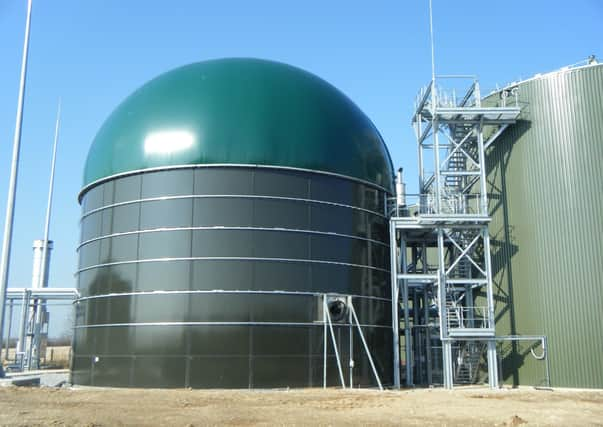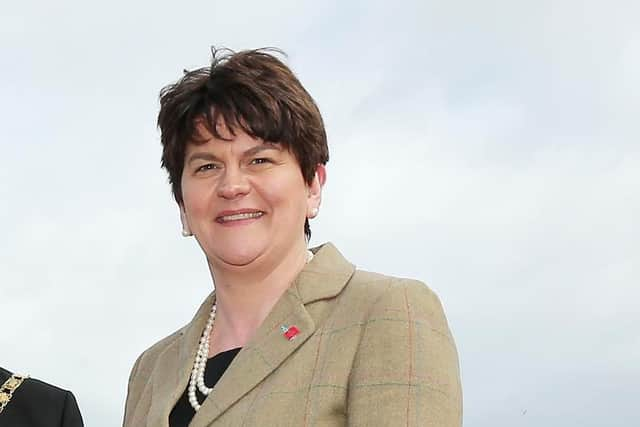Arlene Foster’s officials used dodgy numbers to secure biogas subsidies


The Northern Ireland Audit Office found that a Stormont green energy scheme far more lucrative than RHI saw Arlene Foster approve more generous subsidies than in Great Britain, but managed to get electricity customers in GB to pay for most of it — and the total bill could be £5 billion.
Auditors’ investigation into the Northern Ireland Renewables Obligation (NIRO) which incentivised green electricity from wind turbines, solar panels and anaerobic digesters began after public concern stemming from a 2018 investigation by the investigative website SourceMaterial which set out how alongside ‘cash for ash’ there had been ‘muck for brass’.
Advertisement
Hide AdAdvertisement
Hide AdNow it can be revealed for the first time that documents show how officials in Mrs Foster’s Department for Enterprise Trade and Investment (DETI) — the same department which set up and oversaw RHI — used dodgy numbers to justify the lucrative subsidies back in 2011.


The decision to raise the subsidies available to anaerobic digesters, which produce biogas from waste material to generate electricity, led to a widening divergence in payments between Northern Ireland and the rest of the UK, with it becoming increasingly more lucrative to site such plants in Northern Ireland.
The biogas subsidies were part of NIRO which, as with RHI, is overwhelmingly being paid for by users in England, Scotland and Wales who fund it through a levy on their electricity bills.
The Audit Office said: “We identified a significant risk that some investors may be achieving a higher financial return than was required to encourage adoption of the various supported technologies.
Advertisement
Hide AdAdvertisement
Hide Ad“We also identified that the speed of uptake, (particularly in the two years leading up to the closure of the NIRO) has created significant additional environmental and planning impacts.”
Although the NIRO had been set up under direct rule in 2005, this part of the story begins in 2010 when Mrs Foster issued a call for evidence to enable the introduction of more generous biogas subsidies.
The figures would then be used to build a case that could be taken to Brussels for approval from the European Commission — a crucial step because if the EU believed the scheme was overly generous then it would be classed as illegal state aid to businesses and would be unlawful.
In response to its consultation, DETI received 20 submissions which were in effect feasibility studies from people interested in building anaerobic digestion (AD) plants.
Advertisement
Hide AdAdvertisement
Hide AdAs the Audit Office noted, Mrs Foster was asking for evidence from developers with a vested interest. But even asking a group with a vested interest was insufficient to get the answer they seemed to want — massively increasing the subsidy.
The NIRO scheme, like many environmental subsidies, assumes that smaller-scale technologies will require greater payments to make them viable.
For anaerobic digesters the key threshold was 500kw.
Generating stations with a capacity lower than this would receive four ‘renewable obligation certificates’ — a tradeable commodity which formed the subsidy but whose value fluctuated — for every megawatt hour produced compared with three certificates for a larger plant.
Four certificates would equate to about £60,000 a month for a 500kw plant, as opposed to about £45,000 a month if it was only getting three certificates.
Advertisement
Hide AdAdvertisement
Hide AdIn making the case for the appropriate subsidy for 500kw generating stations, Mrs Foster’s officials actually excluded from their analysis 500kw stations — even though that was the size of installation which would eventually make up most of the plants in the highest subsidy band.
Instead they relied entirely on cost estimates for generating stations below 360kw capacity, units which require a far larger subsidy to be viable because they are less efficient.
A closer examination reveals that according to DETI’s own maths, the 500kw stations required three certificates per megawatt hour to make a 12.5% return (required to meet EU State Aid law), which was already in excess of the 10% return used for calculations elsewhere in the UK.
By the time the application landed on officials’ desks at the European Commission, the key document stated incorrectly that the calculation for four certificates was on the basis of generating stations “less than or equal to” 500kw.
Advertisement
Hide AdAdvertisement
Hide AdIn fact, the underlying spreadsheet shows the opposite was the case: the 500kw to 5,000kw band began at “greater than or equal to 500kw”.
This small inaccuracy made an enormous difference in practice because the developers naturally tend to opt for the largest generating station they can in a given subsidy band.
The Audit Office report shows that in the calculations DETI used to justify its tariff, the department predicted that no one would install a 500kw AD generator — despite that being the most lucrative band — and said it expected far smaller installations.
Ultimately, 67% of all AD plants were 500kw.
A key beneficiary of the subsidy for AD plants was giant poultry processor Moy Park, which now uses the technology to dispose of huge volumes of its poultry litter which in 2010 had been a major impediment to its expansion because at that time it was struggling to dispose of the material.
Advertisement
Hide AdAdvertisement
Hide AdDETI also assured the European Commission in 2011: “We have been careful to ensure that we do not overcompensate particular technologies, or the industry as a whole” — an assurance found by the Audit Office to have been incorrect.
Despite DETI latterly arguing that overcompensation of RHI claimants meant that it had no option but to slash those subsidies — which, unlike the NIRO, had started to eat into Stormont’s own budget — the department has given no indication that it has considered whether it is similarly paying operators of AD plants a level of subsidy which constitutes illegal state aid.
When asked whether this error was the result of a deliberate attempt by officials or ministers to rig the submission to bolster the case for a higher subsidy for AD generating stations below 500kw, the Department for the Economy, DETI’s successor, said: “As has been noted, 500kW stations were not included in the lower band when the 2010 analysis was conducted.
“However, the department can confirm that re-running the analysis to include 500kW stations in the lower band would not change the outcome (ie the result would still be four Renewable Obligation Certificates, based on the information available) and, accordingly, the motivation that you have attributed to the department is unjustified. The rationale that was provided at the time still stands.”
Advertisement
Hide AdAdvertisement
Hide AdRepresentatives of Mrs Foster did not return a request for comment by the News Letter.
• Marcus Leroux is a reporter at SourceMaterial, a not for profit investigative organisation
——— ———
A message from the Editor:
Thank you for reading this story on our website. While I have your attention, I also have an important request to make of you.
With the coronavirus lockdown having a major impact on many of our advertisers — and consequently the revenue we receive — we are more reliant than ever on you taking out a digital subscription.
Advertisement
Hide AdAdvertisement
Hide AdSubscribe to newsletter.co.uk and enjoy unlimited access to the best Northern Ireland and UK news and information online and on our app. With a digital subscription, you can read more than 5 articles, see fewer ads, enjoy faster load times, and get access to exclusive newsletters and content. Visit https://www.newsletter.co.uk/subscriptions now to sign up.
Our journalism costs money and we rely on advertising, print and digital revenues to help to support them. By supporting us, we are able to support you in providing trusted, fact-checked content for this website.
Alistair Bushe
Editor